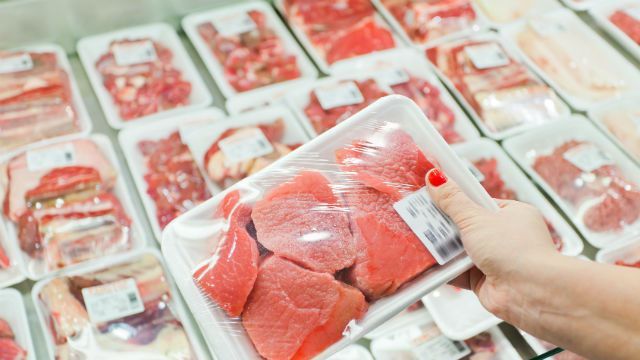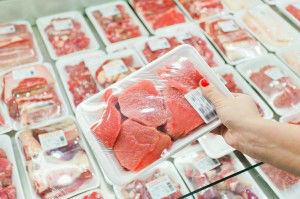
There’s no question about it: stress can certainly be a killer. When we are exposed to chronic stress, it dampens our immune systems’ ability to respond to foreign invaders, opening the door to a wide array of diseases. Stress also has a similar effect on animals.
When anxious livestock exposed to deplorable living conditions are slaughtered for food, the stress hormones in their bodies have a significant negative effect on the nutritional quality of the resulting meat. Eating the meat from stressed out animals can in turn affect our health in negative ways.
A new study, published in the journal Biological Psychiatry, studied the mechanism by which stress can increase the risk of heart disease. It is hypothesized to do so by increasing system-wide inflammation in the body, which over time can lead to atherosclerosis, the hardening of the arteries. This in turn can lead to heart attack, cardiovascular disease and stroke, along with other chronic, inflammatory illnesses.
The study, which was performed by Dr. Peter Gianaros of the University of Pittsburgh and his colleagues, recruited 157 adult volunteers, all in reasonably good health, to view a series of unsavory images while having their brain activity monitored with a functional MRI. The arteries of the volunteers were also examined for inflammation and signs of atherosclerosis.
Results showed that the volunteers who displayed more brain activation in regulating their negative emotions also had heightened levels of certain pro-inflammatory cytokines in their blood, as well as thicker carotid artery walls. This is a known marker of atherosclerosis.
Dr. John Krystal, the editor of Biological Psychiatry, commented, “it is remarkable to see the links develop between negative emotional states, brain circuits, inflammation, and markers of poor physical health.”
Just as in humans, negative emotions and elevated stress levels wreak havoc on the physical health of animals. Animals raised for their meat on industrial (factory) farms are often kept in terrible living conditions where they never see the outside world, and can barely move around. Some buildings where these animals are kept have very little to no light.
These animals are often fed a diet of cheap, GMO grains (a far cry from their natural diet), and some operations even participate in inhumane practices such as de-beaking of chickens. Because of their living conditions and diets, animals often become sick. For this reason, they are often routinely given antibiotics and artificial growth hormones, sometimes on a daily basis, which further elevates their stress levels and introduces dangerous chemicals into their meat.
When it comes time for these animals to be slaughtered, they are frequently transported across great distances to the slaughterhouse, in dark, confined trailers. This leads to even more stress. As a result of both their everyday living conditions and the events, such as transport and sometimes inhumane stunning and slaughter methods, leading up to their deaths, many industrially-raised animals display heightened levels of stress hormones when they are killed.
Because of this, the meat of these animals contains high levels of cortisol, adrenaline and other stress-related steroid hormones. When an animal experiences a spike in these hormones right before it is slaughtered, it can cause a quick drop in the pH of their body, and the breakdown of glycogen in muscle tissues. This can result in PSE (pale, soft exudative) meat, which has a pale appearance, poor consistency and little to no nutrient content.
Sometimes, a condition can occur where pH levels are too high for an extended period of time after an animal’s slaughter. This can lead to DFD (dry, firm, dark) meat, which is very dark in color, is dry in texture, overly chewy, and, like PSE meat, has very little nutritional content remaining. When humans later ingest the meat from these stressed, abused animals, they receive almost no real nutrition from the meat, and may experience adverse health reactions.
On the other hand, when animals are raised on pastures, allowed to roam around outside and eat their natural diets (grass for cows, worms and insects for chickens, etc.), they both lead healthier, happier lives and retain much more nutritional content in their meat. As they are not crammed together in tiny pens, they are less susceptible to diseases, and are therefore not fed antibiotics on a daily basis, as in factory farm operations.
Certain certifications, such as Animal Welfare Approved, Certified Humane and American Humane Certified, ensure that animals are raised in decent living conditions, and that they are slaughtered as quickly and painlessly as possible.
The Food Alliance and the American Grassfed Association also take humane slaughter practices into account when certifying meats. When livestock is both raised and slaughtered on local, family farms that follow organic practices, it is much more likely that the animals’ stress levels remain as low as possible before they are killed.
 We know how badly stress can affect us, and also the havoc it can wreak on animals. If we are what we eat, it follows that we should not be eating the meat of poorly treated, anxiety-ridden animals, besides the obvious moral conundrum of supporting the organizations that mistreat their animals.
We know how badly stress can affect us, and also the havoc it can wreak on animals. If we are what we eat, it follows that we should not be eating the meat of poorly treated, anxiety-ridden animals, besides the obvious moral conundrum of supporting the organizations that mistreat their animals.
When choosing pastured, grass-fed meat, your best bet is a local farmer who is willing to be open about their practices, and tell you about the methods used in both raising and killing the animals.
Another option is to buy your meat at a local organic market, being careful to look for organic certification, and labels such as Certified Humane. However, as labels can be confusing, and some certification programs have very different standards than others, your hometown family farm is always your best bet.
Sources:
http://www.elsevier.com/about/press-releases/research-and-journals/how-does-stress-increase-your-risk-for-stroke-and-heart-attack
http://www.humaneitarian.org/what-is-humanely-raised-meat/#.U4zA2fldUo5
http://wellcommons.com/weblogs/health-beat/2011/aug/31/think-antibiotics-in-your-meat-is-a-bad-
http://www.ncbi.nlm.nih.gov/pubmed/22063148
http://www.steadyhealth.com/articles/Hormones_In_Animals_And_Meat_Quality_a2217.html
https://www.thealternativedaily.com/the-importance-of-grass-fed-foods-for-optimal-health

